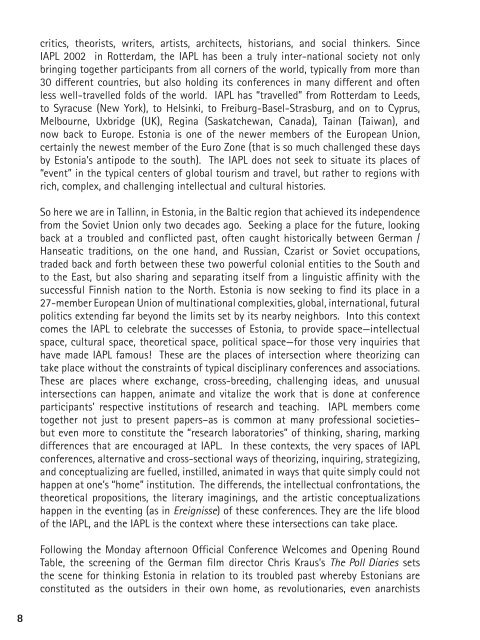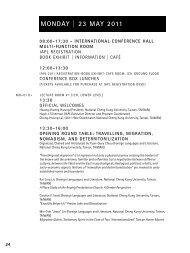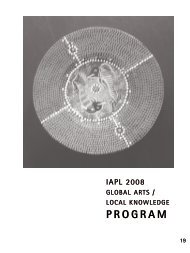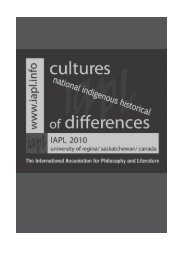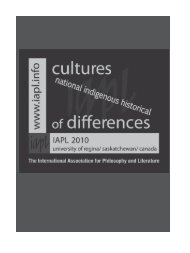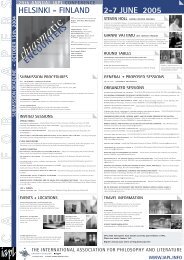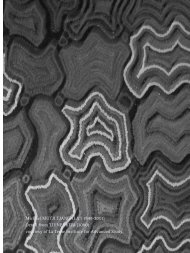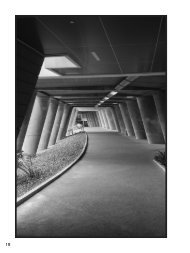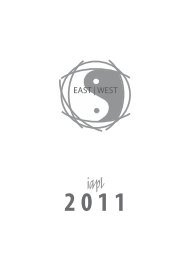IAPL2012-CB-0531-052.. - The International Association for ...
IAPL2012-CB-0531-052.. - The International Association for ...
IAPL2012-CB-0531-052.. - The International Association for ...
You also want an ePaper? Increase the reach of your titles
YUMPU automatically turns print PDFs into web optimized ePapers that Google loves.
critics, theorists, writers, artists, architects, historians, and social thinkers. Since<br />
IAPL 2002 in Rotterdam, the IAPL has been a truly inter-national society not only<br />
bringing together participants from all corners of the world, typically from more than<br />
30 different countries, but also holding its conferences in many different and often<br />
less well-travelled folds of the world. IAPL has “travelled” from Rotterdam to Leeds,<br />
to Syracuse (New York), to Helsinki, to Freiburg-Basel-Strasburg, and on to Cyprus,<br />
Melbourne, Uxbridge (UK), Regina (Saskatchewan, Canada), Tainan (Taiwan), and<br />
now back to Europe. Estonia is one of the newer members of the European Union,<br />
certainly the newest member of the Euro Zone (that is so much challenged these days<br />
by Estonia’s antipode to the south). <strong>The</strong> IAPL does not seek to situate its places of<br />
“event” in the typical centers of global tourism and travel, but rather to regions with<br />
rich, complex, and challenging intellectual and cultural histories.<br />
So here we are in Tallinn, in Estonia, in the Baltic region that achieved its independence<br />
from the Soviet Union only two decades ago. Seeking a place <strong>for</strong> the future, looking<br />
back at a troubled and conflicted past, often caught historically between German /<br />
Hanseatic traditions, on the one hand, and Russian, Czarist or Soviet occupations,<br />
traded back and <strong>for</strong>th between these two powerful colonial entities to the South and<br />
to the East, but also sharing and separating itself from a linguistic affinity with the<br />
successful Finnish nation to the North. Estonia is now seeking to find its place in a<br />
27-member European Union of multinational complexities, global, international, futural<br />
politics extending far beyond the limits set by its nearby neighbors. Into this context<br />
comes the IAPL to celebrate the successes of Estonia, to provide space—intellectual<br />
space, cultural space, theoretical space, political space—<strong>for</strong> those very inquiries that<br />
have made IAPL famous! <strong>The</strong>se are the places of intersection where theorizing can<br />
take place without the constraints of typical disciplinary conferences and associations.<br />
<strong>The</strong>se are places where exchange, cross-breeding, challenging ideas, and unusual<br />
intersections can happen, animate and vitalize the work that is done at conference<br />
participants’ respective institutions of research and teaching. IAPL members come<br />
together not just to present papers–as is common at many professional societies–<br />
but even more to constitute the “research laboratories” of thinking, sharing, marking<br />
differences that are encouraged at IAPL. In these contexts, the very spaces of IAPL<br />
conferences, alternative and cross-sectional ways of theorizing, inquiring, strategizing,<br />
and conceptualizing are fuelled, instilled, animated in ways that quite simply could not<br />
happen at one’s “home” institution. <strong>The</strong> differends, the intellectual confrontations, the<br />
theoretical propositions, the literary imaginings, and the artistic conceptualizations<br />
happen in the eventing (as in Ereignisse) of these conferences. <strong>The</strong>y are the life blood<br />
of the IAPL, and the IAPL is the context where these intersections can take place.<br />
Following the Monday afternoon Official Conference Welcomes and Opening Round<br />
Table, the screening of the German film director Chris Kraus’s <strong>The</strong> Poll Diaries sets<br />
the scene <strong>for</strong> thinking Estonia in relation to its troubled past whereby Estonians are<br />
constituted as the outsiders in their own home, as revolutionaries, even anarchists<br />
8


